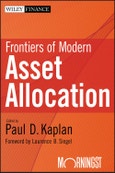Building on more than 15 years of asset-allocation research, Paul D. Kaplan, who led the development of the methodologies behind the Morningstar Rating(TM) and the Morningstar Style Box(TM), tackles key challenges investor professionals face when putting asset-allocation theory into practice. This book addresses common issues such as:
- How should asset classes be defined?
- Should equities be divided into asset classes based on investment style, geography, or other factors?
- Should asset classes be represented by market-cap-weighted indexes or should other principles, such as fundamental weights, be used?
- How do actively managed funds fit into asset-class mixes?
Kaplan also interviews industry luminaries who have greatly influenced the evolution of asset allocation, including Harry Markowitz, Roger Ibbotson, and the late Benoit Mandelbrot. Throughout the book, Kaplan explains allocation theory, creates new strategies, and corrects common misconceptions, offering original insights and analysis. He includes three appendices that put theory into action with technical details for new asset-allocation frameworks, including the next generation of portfolio construction tools, which Kaplan dubs "Markowitz 2.0."
Table of Contents
Foreword xiIntroduction xxiii
A Note on Expected Return and Geometric Mean xxv
Acknowledgments xxxi
PART ONE Equities
CHAPTER 1 Purity of Purpose: How Style-Pure Indexes Provide Useful Insights 7
CHAPTER 2 Investing in Europe with Style: Why Investors in Europe Would Benefit From Constructing Portfolios Through the Prism of Style 15
CHAPTER 3 Why Fundamental Indexation Might - or Might Not - Work 21
CHAPTER 4 The Fundamental Debate: Two Experts Square Off on the Big Issues Surrounding Fundamentally Weighted Indexes 39
CHAPTER 5 Collared Weighting: A Hybrid Approach to Indexing 51
CHAPTER 6 Yield to Investors? A Practical Approach to Building Dividend Indexes 63
CHAPTER 7 Holdings-Based and Returns-Based Style Models 71
CHAPTER 8 Estimates of Small Stock Betas Are Much Too Low 103
CHAPTER 9 A Macroeconomic Model of the Equity Risk Premium 117
PART TWO Fixed Income, Real Estate, and Alternatives
CHAPTER 10 Good and Bad Monetary Economics, and Why Investors Need to Know the Difference 133
CHAPTER 11 Inflation, Gilt Yields, and Economic Policy 143
CHAPTER 12 Reverse Mean-Variance Optimization for Real Estate Asset-Allocation Parameters 147
CHAPTER 13 The Long and Short of Commodity Indexes 157
CHAPTER 14 Less Alpha and More Beta Than Meets the Eye 175
CHAPTER 15 Venture Capital and its Role in Strategic Asset Allocation 179
PART THREE Crashes and Fat Tails
CHAPTER 16 One-and-a-Quarter Centuries of Stock Market Drawdowns 193
CHAPTER 17 Stock Market Bubbles and Crashes: A Global Historical and Economic Perspective 199
CHAPTER 18 De´ ja` Vu All Over Again 211
CHAPTER 19 De´ ja` Vu Around the World 223
CHAPTER 20 Getting a Read on Risk: A Discussion with Roger Ibbotson, George Cooper, and Benoˆıt Mandelbrot on the Crisis and Risk Models 239
PART FOUR Doing Asset Allocation
CHAPTER 21 Does Asset-Allocation Policy Explain 40 Percent, 90 Percent, or 100 Percent of Performance? 253
CHAPTER 22 Asset-Allocation Models Using the Markowitz Approach 267
CHAPTER 23 Asset Allocation with Annuities for Retirement Income Management 275
CHAPTER 24 MPT Put Through the Wringer: A Debate Between Steven Fox and Michael Falk 303
CHAPTER 25 Updating Monte Carlo Simulation for the Twenty-First Century 311
CHAPTER 26 Markowitz 2.0 325
CHAPTER 27 What Does Harry Markowitz Think? A Discussion with Harry Markowitz and Sam Savage 351
Afterword 367
About the Author 375
Index 377
Samples

LOADING...








